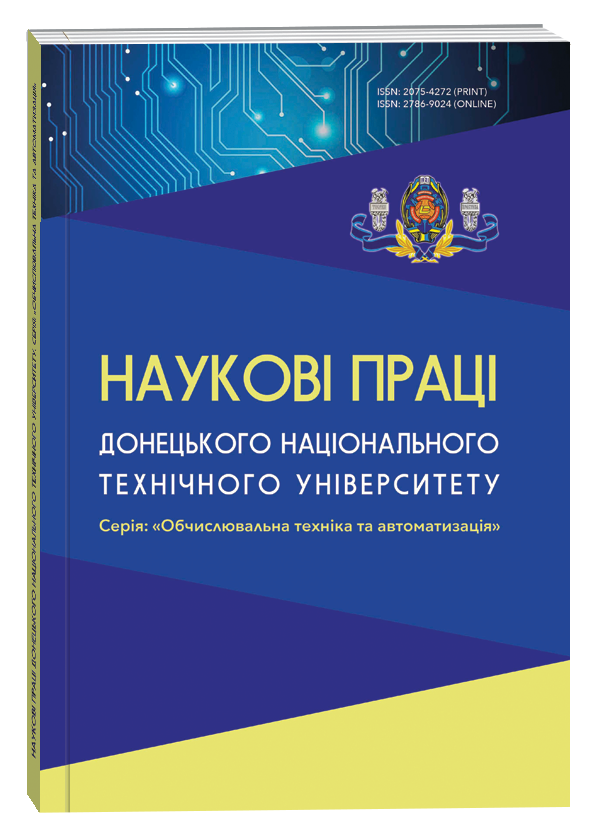RESEARCH OF THE EFFICIENCY OF NETWORKED CONTROL SYSTEMS
DOI:
https://doi.org/10.31474/2786-9024/v2i2(34).301762Keywords:
networked control systems, modeling, NCS, control, stability of operationAbstract
The purpose of this work is determined by the need for a detailed study and analysis of possible problems and shortcomings that arise or may arise when creating networked control systems (NCS). Each of the identified negative factors has its own influence and arises in different situations, has its own characteristics and different nature of behavior and origin. Since a detailed study of the operation of networked control systems is usually accompanied by the process of modeling such a system, for the adequacy and accuracy of the modeling process, it is necessary to create the correct apparatus that takes these indicators into account.
The analyzed information from various sources and the reviewed materials made it possible to create an idea of the main types and types of negative factors and shortcomings accompanying the operation of networked control systems. This approach allows for a faster and more focused response to the cause of possible delays in the operation of network control systems, which are caused by certain limitations. Considering that the indicators of speed and accuracy in the operation of control systems are one of the key ones, it would be fair to consider that the intention to improve the situation with the negative influence of such factors is an appropriate and necessary way. Since NCS is a complex system that contains elements of different levels, the very essence of the identified problems was also determined, i.e. not only the reasons for the appearance and occurrence of these factors were clarified, but also what they are, what they influence and to which it can lead to consequences in certain situations and under different conditions.
Taking into account the possible presence of such negative factors in networked control systems, it seems logical to try to determine approaches and methods that can be used to reduce or neutralize this or that limitation in various possible conditions. Understanding the possibility of the presence of negative factors and imperfections in the operation of networked control systems, we have the opportunity to play ahead and lay elements during the design and construction of such a system that will improve the performance of the system. In relation to these approaches, information is also provided on the conditions in which they can be applied.
Keywords: networked control systems, modeling, NCS, control, stability of operation.
References
R. A. Gupta and M. Chow, “Networked control system: overview and research trends,” IEEE Transactions on Industrial Electronics, vol. 57, no. 7, pp. 2527–2535, 2010.
W. P. M. H. Heemels, D. Nešić, A. R. Teel, and N. van de Wouw, "Net-worked and quantized control systems with communication delays, " in Proc. 48th IEEE Conf. Decision and Control (CDC) held jointly with 28th Chinese Control Conf. , Shanghai, China, 2009, pp. 7929-7935.
Y. Q. Xia, Y. L. Gao, L. P. Yan, and M. Y. Fu, "Recent progress in networked control systems - a survey, " Int. J. Autom. Comput. , vol. 12, no. 4, pp. 343-367, Aug. 201. doi: 10.1007/s11633-015-0894-x
M. Y. Fu and L. H. Xie, "The sector bound approach to quantized feedback control, " IEEE Trans. Autom. Control, vol. 50, no. 11, pp. 1698-1711, Nov. 2005. DOI: 10.1109/TAC.2005.858689. [Online] URL: http://surl.li/vmxkbj/. Accessed: 08.04.2024.
J. L. Xiong and J. Lam, "Stabilization of networked control systems with a logic ZOH, " IEEE Trans. Autom. Control, vol. 54, no. 2, pp. 358-363, Feb. 2009. DOI: 10.1109/TAC.2008.2008319 [Online] URL: http://surl.li/fkovsc. Accessed: 08.04.2024.
D. Zhang, P. Shi, Q. G. Wang, and L. Yu, "Analysis and synthesis of networked control systems: a survey of recent advances and challenges, " ISA Trans. , vol. 66, pp. 376-392, Jan. 2017. [Online] URL: http://surl.li/nlxqif. Accessed: 08.04.2024.
Y. L. Wang and Q. L. Han, "Modelling and controller design for discrete-time networked control systems with limited channels and data drift, " Inf. Sci. , vol. 269, pp. 332-348, Jun. 2014. [Online] URL: http://surl.li/kbbgmc. Accessed: 08.04.2024.
A. L. Garcia and I. Widjaja, Communication Networks: Fundamental Concepts and Key Architectures. New York: McGraw-Hill, 2001.
P. Seiler and R. Sengupta, "Analysis of communication losses in vehicle control problems, " in Proc. 2001 America Control Conf. , Arlington, VA, USA, pp. 1491-1496.
D. Yue, E. G. Tian, Z. D. Wang, and J. Lam, "Stabilization of systems with probabilistic interval input delays and its applications to networked control systems, " IEEE Trans. Syst. Man Cybern. A: Syst. Humans, vol. 39, no. 4, pp. 939-945, Jul. 2009. [Online] URL: http://surl.li/vhngge. Accessed: 08.04.2024.
Downloads
Published
How to Cite
Issue
Section
License
Copyright (c) 2024 Ivan Chystyk, Viktoriya Voropayeva

This work is licensed under a Creative Commons Attribution-NonCommercial-NoDerivatives 4.0 International License.





